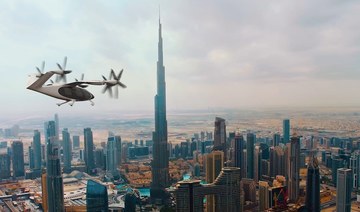LONDON: Telegram, the messaging app that re-located from Russia to Dubai, has again fallen foul of the authorities in its mother country. So what is it about the social media platform that simultaneously has governments worldwide so concerned and freedom of speech advocates so agitated?
Telegram has always attracted a mix of criticism and respect for its use of encryption to ensure its messages between users remain confidential.
A Moscow court decided last week to block the app in Russia because it refused to hand over encryption keys to authorities — sparking fresh controversy around the app, which has previously been banned in countries such as Iran, Afghanistan and Indonesia.
Telegram has been under close scrutiny in Russia since legislation was passed in mid-2016 that required communication companies to hand over encryption keys to the Federal Security Service (FSB), if requested.
There was also a move to place companies on a “register of information distributors,” which requires firms to store user online communications for a set period of time and hand over data to the authorities when needed.
Some of Russia’s large social networks are reportedly on the register and Telegram was pressurized to register in mid-2017. Other Western social media companies such as WhatsApp are not listed. WhatsApp did not immediately respond to a request for comment.
Weeks after joining the register, Telegram refused to agree to FSB requests for encryption keys, resulting in the Russian media watchdog Roskomnadzor seeking court approval this month to block the app.
On the day of the court decision, Telegram’s founder Pavel Durov tweeted: “Privacy is not for sale, and human rights should not be compromised out of fear or greed.” The company has also said it is technically impossible to transfer encryption keys.
It was not the Russian entrepreneur Durov’s first run-in with Russian authorities. Telegram — which was launched in 2013 — originally had its development team based in St. Petersburg, but had to leave the country due to local IT regulations. It is currently based in Dubai.
The messaging app prides itself in being the most secure and independent form of instant messaging that respects the need for privacy. Its “secret chats” option makes use of end-to-end encryption that ensures only users can read them. Messages cannot be forwarded and you can order messages to “self-destruct” within a set amount of time. It can also alert users if the recipient of the message takes a screenshot of the correspondence. So-called Telegram “Channels” can be used to broadcast public messages to a large audiences.
While WhatsApp — which is owned by Facebook — also provides end-to-end encryption, Telegram differentiates itself with claims it is faster and more secure.
Damir Gainutdinov is a legal analyst at Russian human rights group Agora, which represented Telegram in court. He has headed up its project on the defense of online freedom in Russia since 2010.
He told Arab News that the block placed on Russia was more of a power-play by the authorities.
“I think that Russian authorities believe that Telegram is a threat because they cannot control it.
“But I wouldn’t say that it is really the biggest threat. The attack on Telegram is more about showing that they can block any global service if they want,” he said.
Russia’s government has argued that the app helps to enable terrorist attacks in the country, saying that access to encrypted messages is a national security issue.
The FSB said a suicide bomber who killed 15 people on a St. Petersburg subway in April last year had used Telegram to plan the attack.
Voices from outside Russia have also criticized Telegram for not doing enough to clamp down on terrorists using the app. “Terrorists and extremist groups such as ISIS (Daesh) use encrypted applications like Telegram because it allows them to recruit new members, fundraise, incite to violence, and even coordinate terrorist activity without the threat of being discovered,” said executive director David Ibsen at the US-based non-government organization Counter-Extremism Project.
“ISIS also created public channels on Telegram to broadcast pro-ISIS news updates and disseminate other propaganda materials,” he told Arab News. Durov has been quoted as saying at a conference in 2015 that the right to privacy is more important to the company than “our fear of bad things happening, like terrorism.” Following the Paris attacks in 2015, Telegram did revise its policy on its public channels, but it has refused to take down private Daesh chats, according to Ibsen.
Social media sites are coming under increasing pressure from authorities worldwide to do more to limit the promotion of extremism online.
In a statement to Arab News, Twitter said it had permanently suspended 274,460 sites in the second half of last year — down more than 8 percent on the previous reporting period.
While Telegram is far from the only social media app to be criticized for its counter-terrorism policies, it is seen by some as the more reluctant player in the battle against online extremism. “Social media companies remove content regularly that violates their stated terms of service, and some of this includes extremist and terrorist videos, images and other propaganda,” said Ibsen. “However, despite the availability of technology that can identify and permanently prevent prohibited materials from being re-uploaded, the biggest social media platforms are not taking this vitally important step,” he said.
“Telegram has become a refuge app from the moment the preferred apps (Twitter in particular) started to clamp down on extremist content,” said Rik Coolsaet, a professor of international relations at Ghent University in Belgium who has written extensively on counter-terrorism efforts. “Its encryption offered a secure environment for terrorist recruiters and groomers, but at the same time limited their propaganda outreach, since it is more difficult to access. For that reason, Twitter remains their preferred app,” he added.
Russia is not the only country clamping down on Telegram. Iran restricted certain channels in December last year during the protests and there have been recent threats that restrictions could be reimposed. A estimated 40 million Iranians use Telegram’s channels and messaging services.
“In the case of Russia and Iran, the Telegram crackdown has much more to do with controlling the lives of its citizens than it does with preventing terrorist activity,” said Ibsen.
Telegram did not respond to Arab News’ request for comment.
Q&A
We talk to leading world cyber terrorism expert Chris Sampson, co-author of “Hacking ISIS: How to Destroy the Cyber Jihad” and an analyst with the Terror Asymmetrics Project
Why are governments so worried about Telegram?
Telegram was launched as an encrypted messaging app. This meant that government agencies were less likely to be able to intercept messages passing across the Internet and read private conversations. However, in September 2015, Telegram also created an option for channels, which act like chat groups. This allowed like-minded individuals to essentially host a chat room. Unless the channel was set to public you couldn’t read what was discussed without being given an invitation link. Groups like ISIS began using these channels to share propaganda and information. Other groups use Telegram in much the same manner. Non-violent resistance groups around the world would also use the messaging app and channels to communicate so authorities in the countries they fear would be less likely to intercept their discussions.
Will clamping down on social media apps be effective?
As governments crack down and ban apps, others will rise and replace them with new features and focus on security from outside eyes. They will operate either within the legal construct or outside of it depending on the countries they seek to circumvent. Since laws around the world differ dramatically, what is legal in one country could be illegal in another. We’ve seen this already happen as countries sought to ban use of Telegram, WhatsApp or even Twitter. Inevitably the access to the technology remains the same and users find a way to use both encrypted messaging and social media platforms.
Does Russia’s action set a precedent?
Countries such as Indonesia, Iran, Afghanistan and others have banned Telegram. Brazil banned WhatsApp around the timing of the World Cup only to lift the ban. Such bans are largely ineffective because the majority of users are engaged in lawful communications yet want their privacy, those engaged in illegal and potentially violent activities make up a fraction of the userbase. The better solution is to know where nefarious users are lurking on the web and keep track of them in observable spaces. Banning the public’s access to messaging apps will always fail. Telegram and similar companies should deny government agencies the keys to encryption unless there is a reason given that would justify unlocking communications. If the governments are able to seize a phone and unlock it, they’ll already have access to a suspect’s communication if they haven’t erased the data.





















